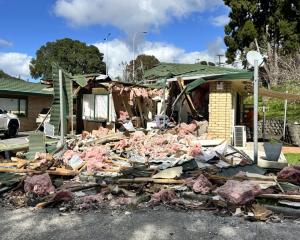Forty leaderless and confused pilot whales restranded themselves today about 400 metres from where they first beached on Farewell Spit, the Department of Conservation says.
A pod of 99 pilot whales stranded about 7km along Farewell Spit at about 10am yesterday. Seventeen had refloated by this morning, 36 have died since first beaching, and six remain unaccounted for, said Doc area manager John Mason.
The refloating efforts to move 40 remaining whales looked promising by 10.30 this morning. The pod had been herded together and pointed out to sea, he said.
"We tried to refloat the other 40 and they simply wouldn't move. We tried pushing them out to sea, and they just wouldn't go.''
Instead of swimming out to sea, the pod headed about 300-400m north-east of where they were moved on from.
They promptly restranded in shallow, sandy conditions parallel to the beach less than four hours later, at 2.15pm, he said.
"It's just a big flat sandy area and they are just moving around on that. I personally think they are confused, and I think they are also leaderless. They just seem to mill around directionless and leaderless.''
"This is quite typical behaviour of stranded whales. It's not unusual for them to act this way.''
Mr Mason said everyone was "disappointed'' when the whales re-beached, but he noted the tide quickly receded from the area.
He said up to 200 Doc and Project Jonah workers, volunteers and holidaymakers had been out on the site today to navigate the pilot whales into deeper water.
Helpers had been working roughly three to a whale, and were drenching sheets placed over the whale's back with water to stop their skin blistering in the heat, he said.
But the life span of the whales could be limited if they did not manage to refloat themselves at high tide at 11.38 tonight, he said.
"They are still ok. They are being looked after quite well but then again they have been through two tide cycles now so that's got to have an effect on them.''
"The best chance of success of refloating whales is at the first high tide, and the success rate diminishes from then on.''
He said the animals grew distressed with every tide change, which made it harder to refloat the large mammals.
Workers were slowly being pulled off the efforts and transported back from the coastal location by 6pm tonight, he said.
The plan was to see whether the pod had made it out to sea by the morning: "If they are still there, we'll reassess what we can do for them. They could have moved further down the spit in another direction. We've got an open mind.''
The whale stranding is the third this summer, and is only 2km from where 25 whales beached earlier this month. Eighteen died.













